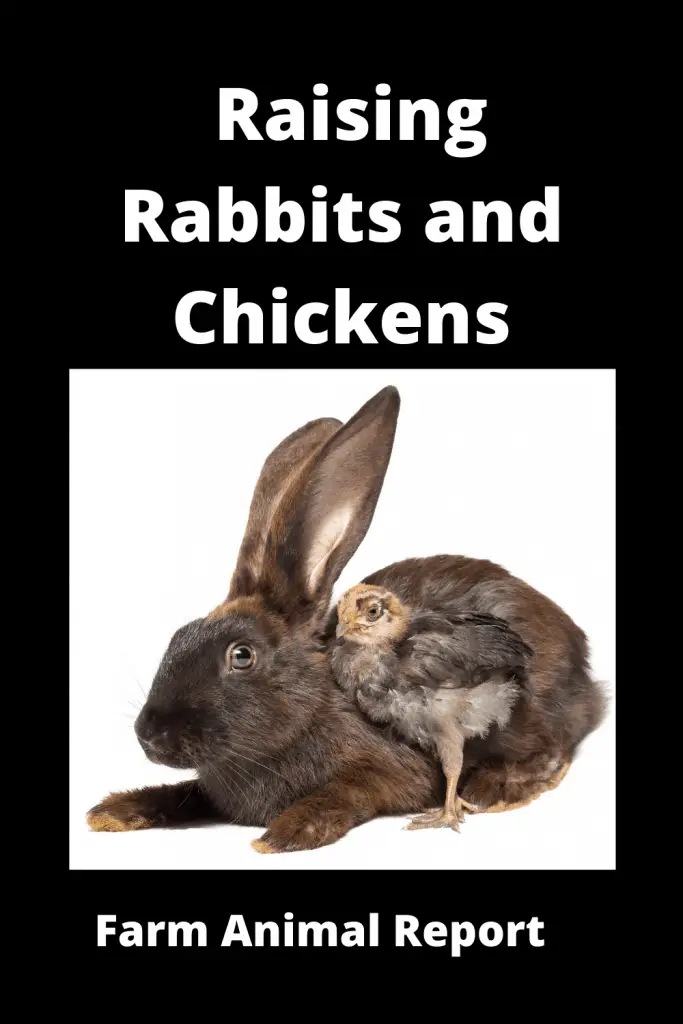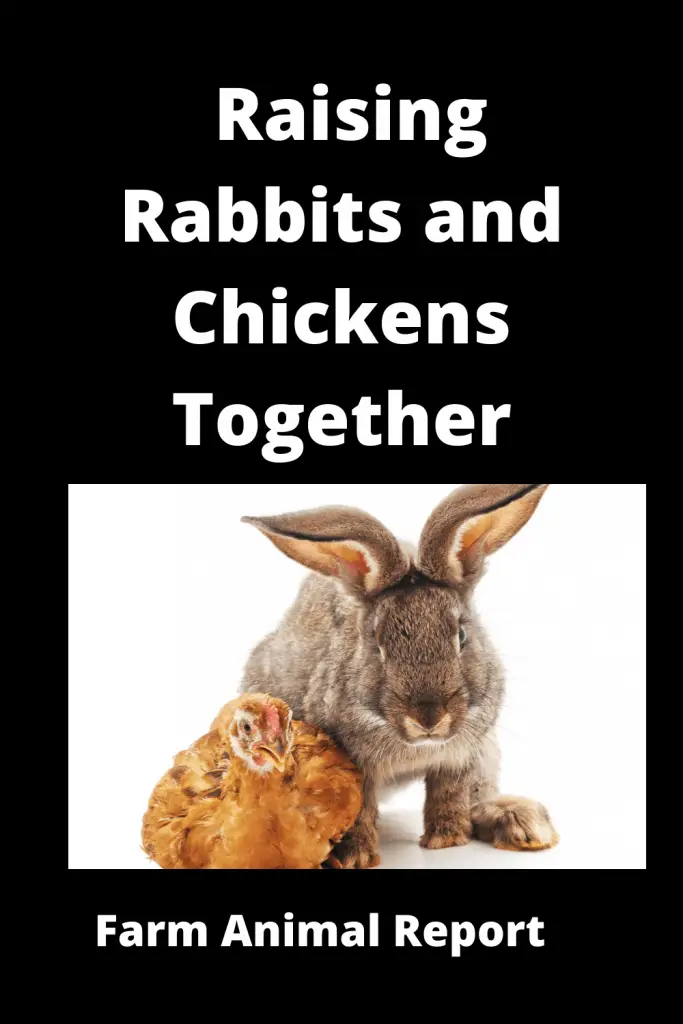As a general rule Farmers do not raise chickens and rabbits together. There is a great difference in the nature and behavioral patterns of both animals. Rabbits are clean, but their feces has a pungent odor. Chickens are less so. Farmers have done it. Challenges are to Consider diseases, care, food, and other concerns before putting them together. On the other hand, rabbits are very much specific and possessive about their territory and they don’t really like other animals to interfere in it.
Housing Rabbits and Chickens Together
Raising Rabbits and Chickens Together. Rabbits and chickens are reared for meat and other useful products. They are also beneficial and profitable for all those small farmers who have confined or less farm space. If you’re a small farm owner, you may be tempted to put your chickens and rabbits together. Housing Rabbits and Chickens Together? Rabbits and chickens aren’t made for each other. Consider diseases, care, food, and other concerns before putting them together. Do Rabbits and Chickens Get Along?
As there is a great difference in the nature and behavioral patterns of both animals. Here, we will discuss some important and practically implementable points that every farm owner who wishes to rear them together should understand. In addition to that, a number of advantages and disadvantages associated with their mutual raising will also be enlisted.
Raising Rabbits and Chickens Together / Can You Keep Them Together
Check Out Amazon for Resources about Breeding Rabbits
This can be a good idea of raising them together and letting them share the same hutch. But there is still a need for many precautions while gathering them together.
You can also Read our Guide –18 Ways to Make Money by Rabbit Farming—Extensive Guidelines for Rabbit Farmers
Rabbits and Chickens Common Factors
Rabbits and chicken have some commonalities. They’re both predominantly outdoor pets,
On the other hand, rabbits are very much specific and possessive about their territory and they don’t really like other animals to interfere in it.
12 Ways to Make Money by Chicken Farming—Extensive Guidelines for Chicken Farmers
Check Out Amazon for Educational Resources for Breeding Chickens
There are the following important points which can be really helpful while keeping them together.

Again, with time and dedication, keeping chickens and rabbits together can work. All animals are capable of forging unlikely friendships. Despite this, some ground rules must be observed. Chickens and rabbits will only tolerate each other’s company under the following circumstances.
How Early Age Training Can Become Helpful
It is best to introduce them to each other from a very young age. As both species grow older, they’ll become set in their ways and increasingly intolerant to each other with the passage of time. This is how young age training plays an important role in acclimatizing both different species with each other.
How Clean Environment Encourage a Good Bond Between Them
HEALTHY ENVIRONMENT HEALTHY ANIMAL
Another important factor to enhance a good association between chickens and rabbits is to ensure the high-level cleanliness of the environment(hutch/coop). Rabbits are cleaner than chickens. They’ll grow distressed if they’re surrounded by filth. So, keeping the environment neat reduces stress in rabbits and also stops disease transmission.
Rabbits are clean, but their feces has a pungent odor. Chickens are less so, so you’ll need to clean the coop regularly. This means that your rabbit will live in more sanitary conditions.

Why Spaying and Neutering of Rabbits is Important
By nature,
Male rabbits will mount anything in sight.
This may be sexual in nature, or it could be an act of domination. Either way, neutering will calm them down. This procedure is recommended to reduce aggression and urine spraying. This must be done to place rabbits and chicken together.
Why You Should Not Keep a Pair of Rabbits and Chicken Alone
One chicken and one rabbit will make both of them feel stressed and lonely. So, don’t hope for the good, if you keep a pair of these two animals together. All along with that, this loneliness can give rise to many undesirable consequences leading to a bad experience.
How to Handle Aggressive Behaviour
If you find any disturbance in the relationship between chickens and rabbits, it is recommended to separate both on immediate grounds to prevent further aggression between them.
Why is it Necessary to Give Rabbits Privacy
While raising them together, it is another important consideration to give rabbits some privacy and space as they are so much conscious about privacy. If you don’t provide privacy intervals, they will become overwhelmed and annoyed.
What are Pro’s of Raising Rabbits and Chickens Together

After having a look at some considerations, let’s have a bird’ eye view on a few important advantages to raise them together.
1) This is the best and profitable option for small farm owners as one large coop for all your animals is more space-efficient than each type of animal living in separate homes. The integrated housing system reduces space cost and also management becomes easier as compared to a separate housing system.
2) If you can’t keep your rabbits indoors, chickens will provide them good company. You’ll be amazed to know that, how well these animals get along, provided that they’re introduced early enough.
3) Chickens and rabbits are prey species and even attract the same predators. They’ll enjoy more safety in numbers. This is how keeping them together ensures their security.
4) Rabbits and chickens are hardy and cope well with cool weather. They both flourish in the winter. There’s no need to worry about one species needing more heat than the other. So, temperature management becomes easy for owners.
5) This is fun to watch chicken and rabbits interacting with each other. A really relaxing and amusing sight for owners if well managed.
What are Con’s of Raising Rabbits and Chickens Together
As we have discussed a few practical advantages of raising these two animals together, now let’s have a brief overview of some disadvantages.
Health Concerns
The major issue of keeping rabbits and chickens together is the spread of infectious diseases among them. Health concerns can become worrisome for their owners.
- Coccidia
- Salmonella
- Pasteurella
- Streptoccosis
- Myxomatosis
Both animals can infect each other in different ways. Coccidia is common between both species, salmonella, Pasteurella multocida and streptococcosis pose more significant problems. Salmonella is endemic to chickens and can make your rabbits sick.
Similarly, pasteurellosis can cause cholera if transferred from rabbits to chickens. Because chickens will eat rabbit feces and defecate wherever they are, it is likely that both species will share diseases, which could prove fatal.
On the other hand, Myxomatosis, the rabbit-killing virus, will not affect chicken. This condition is unique to rabbits, and a few rabbits have been diagnosed depending upon the locality.
If one rabbit in a coop develops myxomatosis, it will spread like wildfire. Expect all bunnies that live together to be affected in short order. The most likely way of a rabbit contracting myxomatosis is through flea bites.
A bug carrying the disease may feed on a chicken and cause no ill effects as poultry are immune. If the same flea or tick then bites a rabbit, the virus will not die off and will cause infection.
What Precautions Should Be Taken to Check These Health Issues
You need to step up the hygiene of your shared coop/place. Coccidiosis is found in chicken feces, so you need to keep your rabbit away from it by maintaining the sanitation of the environment.
If you keep rabbits alone, you can clean its hutch once a week. If you keep chickens alone, a deep clean is needed infrequently. Keeping the animals together means that you’ll need to clear their space regularly.
If the coccidiosis is caught early, the rabbit will likely make a full recovery. Medication along with separation can give nice outcomes.
Do Chickens Attack Rabbits
Chickens are not crazy about animals that move quickly. This can be an issue at first as rabbits love to run. It may result in some growing pains when the two species first share a space.
What’s likely to happen is a peck from the chicken to the passing rabbit. All being well, the rabbit won’t notice. It certainly shouldn’t hurt it. After a while, the chicken will stop this behavior.
Chickens will devour anything they get their beaks on, and this could include baby rabbits. Never breed rabbits in a communal coop as it’s not safe for the rabbit offspring.
Can Rabbits Harm Chicken’s Eggs
Rabbits are herbivores Despite this, remember that rabbits are also curious. They may wonder what this strange thing in their house is. This will inspire them to investigate. They’ll sniff, nudge, and may even break the eggshell.
Chickens are protective of their eggs, so a rabbit messing with them may lead to conflict. It’s not just the hen that laid the eggs, either. Chickens take turns in keeping the eggs warm. A rabbit may learn this the hard way.
What Construction Materials for Shared Coop
Following characteristics should an ideal shared coop must have:
1) The roof must be robust and waterproof.
2) You must prevent rabbits from digging or they’ll create an escape route.
3) The floor can’t be made of wire, though. This will hurt the feet.
4) The coop must be secure as chickens are rabbits that attract predators. Don’t use a solid front cover as this will prevent ventilation, and don’t use wire that will hurt a curious rabbit.
Other Big Considerations
Mounting
A male rabbit may mount every chick in the coop. Neutering will help, but it may not stop the behavior altogether. Rabbits have delicate skin and may hurt themselves on a wire chicken coop. Use suitable materials for both species.
Digging
Rabbits love to dig, so you’ll need hard floors to prevent escape. This flooring can be uncomfortable for the chicken’s feet.
Rabbits are small animals with big hearts. This means that, if they feel threatened, they may attack chickens. This can be a dangerous situation. If a rabbit is annoyed, it can be surprisingly vicious. Rabbits are also territorial. They may become antagonistic if they feel a chicken is encroaching on ‘their land.
This is why it’s so important to introduce animals when they’re young. The rabbit is more likely to accept sharing their space this way. Warning signs that a rabbit is planning an attack include:
If you spot these behaviors, remove the rabbit from the coop for a time-out. Act quickly. Moreover, it is also important to keep a defined and easily adjustable ratio of rabbits and chickens to prevent any issue afterward.
https://hencam.com/faq/rabbits-and-chickens/
https://thehensloft.com/rabbits-and-chickens-together/
https://urbanhomestead.org/135/
Author: Dr. John Abbas
DVM M.Phil
Chicken / Poultry Breeder Associations
| Rabbit Association | Location | Link |
|---|---|---|
| US Poultry & Egg Association | United States | USPA |
| American Poultry Association | California | APA |
| Ohio Poultry Association | Ohio | OPA |
| National Chicken Council | United States | NCC |
| British Poultry Council | United Kingdom | BPCE |
| Poultry Club of Great Britain | United Kingdom | PCGB |
| Association of Poultry Breeders in EU | Europe | AVEC |
| Australian Chicken Meat Federation Inc | Australia | ACMF |
| Australian Poultry Hub | Australia | Poultry Hub |
Rabbit Breeder Associations
| Rabbit Association | Location | Link |
|---|---|---|
| American Breeders Association | United States | ARBA |
| House Rabbit Society | California | HRS |
| Ohio States Rabbit Breeders Association | Ohio | OSRBA |
| Livestock Conservancy | North Carolina | LC |
| Rabbit Welfare Association and Fund | United Kingdom | RWA |
| British Rabbit Council | United Kingdom | BRC |
| European Association of Rabbits.... | Europe | EAP |
| Australian National Rabbit Council | Australia | ANRC |
| Australian Rabbit House Society | Australia | ARHS |
| ARBA - Rabbit Shows | United States | ARBA - Shows |





